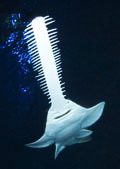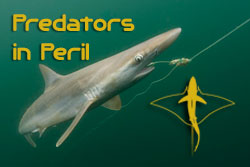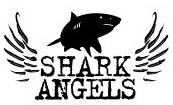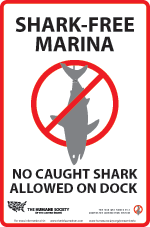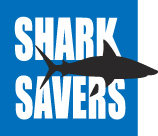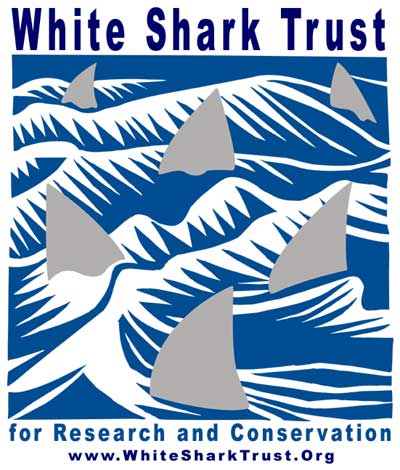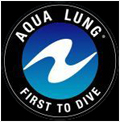|
|
|
SHARK INFO |
|
SHARK |
|
SHARK EVOLUTION |
|
|
|
SHARK DIVING |
|
SHARK DIVING 101 |
|
|
|
CONSERVATION |
|
|
|
PHOTOGRAPHY |
|
SHARK PHOTO TIPS |
|
|
|
RESOURCES |
|
|
|
WEB STUFF |
|
WHAT IS ELASMODIVER? Not just a huge collection of Shark Pictures: Elasmodiver.com contains images of sharks, skates, rays, and a few chimaera's from around the world. Elasmodiver began as a simple web based shark field guide to help divers find the best places to encounter the different species of sharks and rays that live in shallow water but it has slowly evolved into a much larger project containing information on all aspects of shark diving and shark photography. There are now more than 10,000 shark pictures and sections on shark evolution, biology, and conservation. There is a large library of reviewed shark books, a constantly updated shark taxonomy page, a monster list of shark links, and deeper in the site there are numerous articles and stories about shark encounters. Elasmodiver is now so difficult to check for updates, that new information and pictures are listed on an Elasmodiver Updates Page that can be accessed here:
|
|
_ |
|
SHARK CONSERVATION ORGANIZATIONS, ACTIVISTS PROTECTING SHARKS AND CONSERVATION PROJECTS |
|
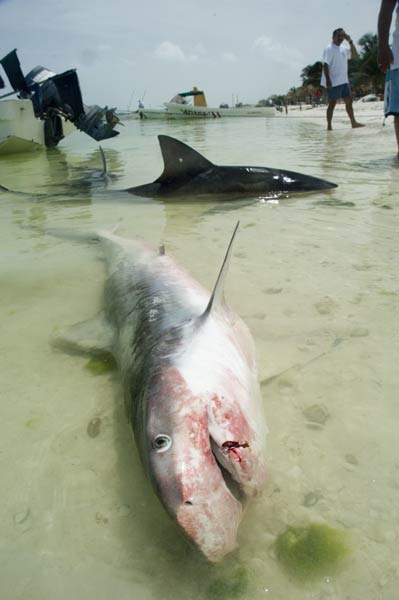
|
Shark Conservation is a vitally important part of helping to maintain a healthy balance in the world's oceans. Many organizations have picked up the torch. Most need help from concerned people like you. Some fight globally to limit the effects of commercial shark finning. Others concentrate on protecting sharks in a specific region where over-fishing and environmental degeneration are causing shark numbers to plummet dangerously. This area of Elasmodiver is designed to introduce the shark charities and organizations that are working (usually with little or no funding) to counter the pressure that sharks and rays are under. Supporting these shark protection organizations doesn't have to be a time consuming or expensive proposition (but if you are feeling philanthropic there are many worthy causes). Often, it is simply a matter of adding your name to a petition or agreeing to copy and paste an email to key government officials. The results that you and others can jointly achieve by these small actions can be significant. Big fishing has a big voice. Large fishing consortiums are able to retain professional lobbyists whose job it is to wine, dine and coerce decision makers into passing legislation in favor of commercial fisheries (which is generally against the best interests of shark populations). Sometimes the only way to go head to head with these companies is by raising an equal amount of money to spearhead a campaign in favor of stricter legislation protecting sharks. Not all Shark Champions fight with the pen. If you prefer to support a more hands on approach then there are organizations out there like Sea Shepherd that put themselves in harms way because sometimes that is the only way to stop the carnage. Some organizations are more fiscally responsible than others, some have bigger teeth, and some work purely to educate the masses in the hope that future generations will be more conscious of the plight of sharks, but all of the organizations listed here do more good than harm and whoever you choose to support, the sharks will benefit.
If you would like your organization to be featured on this page please contact elasmodiver.
|
|
|
Oceanic Defense is a global
organization with members in more than 60 countries with 1
mission - healthy aquatic ecosystems free of human abuse and
neglect. Oceanic Defense aims to change perception - to really
show people that how we live our lives - whether near or far
from the water - affects everything that happens in our oceans. |
|
|
PREDATORS IN PERIL The project involves working in the field with artisanal shark fishermen and scientific researchers to obtain live images and video footage of rare and endangered elasmobranchs in their natural habitats. Each field expedition is accompanied by an intensive media campaign consisting of public exhibitions, magazine articles, internet promotion, and television and radio interviews.
|
|
|
SEA SHEPHERD Sea Shepherd's flag ship The Farley Mowat has harassed shark fishing boats in Costa Rican waters and sent sailors sprawling over their decks after being hit by The Marley Mowat's water cannons. Captain Watson also manages to fit a lecture circuit into his busy schedule, during which he educates anyone willing to listen on the plight of whales, dolphins, seals, and sharks. Sea Shepherd's second vessel is on permanent patrol in the Galapagos area where Park Rangers are virtually helpless against the Ecuadorian fishing boats that brazenly ignore the protection afforded to the park by its world heritage site status. Even with Sea Shepherd's vigilant patrols the rangers are so out numbered that fishermen have an almost unimpeded run of the islands and the Galapagos Sharks that once schooled in vast numbers around Darwin Island have all but vanished.
This kind of hard line activism is not for everyone. The Sea Shepherd crew have been deported, locked up, threatened, and roughed up on many occasions. Violent confrontations at sea may not fit with your particular code of behavior or ethics but what makes you more uncomfortable: sponsoring Sea Shepherd's activities that achieve direct results in the protection of endangered creatures, or lobbying deaf government officials while the wholesale slaughter of our oceans sharks and whales continues unchallenged?
If Sea Shepherd seems like a worthwhile organization with which to take a stand, you can help them in a variety of ways. Joining Sea Shepherd with a modest contribution, helps with the provisioning, fueling, and maintenance of their ships. As a member you may also have the chance to sign on as a volunteer for a tour of duty on one of their campaigns. On their website they list what skills they are looking for in new crew members but they also take unskilled deckhands that are willing to work hard.
|
|
|
The Shark Alliance was formed in 2006 in an attempt to streamline the efforts of NGOs involved in shark conservation. The Alliance is able to utilize the manpower, resources, and combined knowledge of its member organizations to more effectively lobby for sustainable European and global shark fishing limits. Members of the Shark Alliance include The Shark Trust, the European Elasmobranch Association, and The Ocean Concervancy, among others.
In its own words: The Shark Alliance is a not-for-profit coalition of non-governmental organizations dedicated to restoring and conserving shark populations by improving European fishing policy. Because of the influence of Europe in global fisheries and the importance of sharks in ocean ecosystems, these efforts have the potential to enhance the health of the marine environment in Europe and around the world.
The mission of the Shark Alliance is two-fold: To close loopholes in European policy regarding the wasteful and unsustainable practice of shark finning; To secure responsible, science-based shark fishing limits for long-term sustainability and ecosystem health.
Sharks have evolved over 400 million years and play a critical role in ocean ecosystems. In common with land predators such as lions and wolves, sharks keep other marine populations in check and help maintain the balance of life in the sea. Today, primarily because of overfishing sharks are among the oceans’ most threatened animals. Tens of millions of sharks are killed each year, either intentionally or as bycatch in commercial and recreational fisheries. Ongoing assessment of the status of European sharks (and closely-related rays) by the IUCN (The World Conservation Union) has led to the classification of roughly one third of evaluated species as threatened (either Critically Endangered, Endangered or Vulnerable), with another 16 per cent at risk of becoming so in the near future. Sharks generally grow slowly, mature late and produce few young. Shark populations are therefore especially vulnerable to overexploitation and slow to recover once depleted. The loss of these important predators is predicted to have negative effects on many other species in the sea. Unfortunately, however, misinformation and fear all too often impede the public support required to ensure sharks receive management priority and conservation actions. Unlike many countries that fail to conserve sharks, Europe does not lack the resources to restrict fishing. Despite immediate threats facing sharks there are few European limits on shark fishing, and quotas are routinely set far in excess of actual catches. In 2003, the EU adopted a ban on shark finning (the wasteful practice of slicing off a shark’s fins and discarding the carcass at sea), but at the same time allowed glaring loopholes that render the ban all but meaningless. For instance, shark fishermen are allowed to land shark carcasses and fins separately, making it all but impossible to tell how many sharks have been processed on board and how many were subjected to shark finning. Meanwhile, the fin to carcass ratio (the means of checking that the number of fins corresponds to the number of carcasses – after sea processing – is within the ban’s limits) is the highest and therefore the most lenient in the world. Europe is home to the some of the world’s largest fishing fleets while its powerful fisheries officials exert influence on international fishing restrictions in many regions of the globe. Poor European shark policies, therefore, pose threats not only to shark populations in European waters but also to those around the world. If fisheries are managed carefully, sharks can provide a steady source of food and recreation and help keep the oceans in balance. The Shark Alliance is dedicated to ensuring that these valuable yet vulnerable animals survive and thrive for the benefit of ocean ecosystems and the people that depend on them.
|
|
|
SHARK ANGELSThe Shark Angels are raising awareness on the plight facing sharks, giving the world a new perspective on these misunderstood animals, and often, in the trenches, stopping the slaughter of sharks, protecting them from our collective greed and ignorance. Instead of talk, we are all about action. We are making a difference.The Angels have a
singular goal and believe that by harnessing the power of the
passionate, together, we have the power to do what many
disbarment efforts cannot: together we can save sharks. The
Shark Angels raise awareness to the critical issues and also
attempt to change perspectives. Through action, lead a worldwide movement to save sharks.
Launch a globally connected, though locally targeted, campaign to end the worldwide slaughter.
Bring the issues facing sharks into public consciousness.
Improving the image of sharks.
|
|
|
SHARK-FREE MARINAS: REDUCING WORLDWIDE SHARK MORTALITYThe Shark-Free Marina Initiative has a singular purpose, to reduce worldwide shark mortality. We encourage shark conservation at sport fishing and resort marinas by prohibiting the landing of any shark at the participating marina. The SFMI works with marinas, fishermen and like minded non-profit groups to form community conscious policy and increase awareness of the need to protect our sharks, our ocean and our legacy. Participating marinas encourage sport shark-fishermen to exercise catch-and-release techniques. The acceptance of catch-and-release fishing techniques represents an incremental step in protecting valuable marine resources as well as providing valuable data for research organizations. |
|
|
SHARK SAVERS
Shark Conservation Education and Empowerment:
Other Shark Savers Projects:
|
|
|
The Shark Trust was established in 1997 to study, protect, and manage the elasmobranch species found in UK waters and internationally. It is a member of the European Elasmobranch Association and works with other EEA organizations to counter the enormous fishing pressure that European shark and ray stocks are under.
The Shark Trust's mandate includes:
The Shark Trust encourages scientists, divers, fishermen, anglers, and the general public to join the growing number of ST members that currently lend their support. Your membership in The Shark Trust adds to the pressure that it is able to be put on governing and regulatory agencies, and helps spread awareness on the plight of sharks and rays in general. Subscription to The Shark Trust carries no obligation on your part unless you wish it to. However, if you would like to help educate or raise funds your added contribution will be most welcome. Shark Trust members receive the trust's magazine/newsletter 'Shark Focus' 3 times per year. This is a glossy publication that chronicles the latest work of the trust and has articles on a variety of shark and ray subjects. Upon joining the trust you will also receive i.d. posters of British shark and ray species and other Shark Trust goodies.
The Shark Trust also hosts a highly informative website with sections on all aspects of sharks and rays. The site also contains a good image database of elasmobranch species and an active and well moderated forum for anyone wishing to talk sharks.
|
|
|
The South African based White Shark Trust is "a non-profit organization founded in 2002 to promote and conduct research, education and conservation projects on the endangered Great White Shark" It is the brain child of Michael Scholl (founder and trustee) who has been conducting research on Great White Sharks since 1997. The goals of the White Shark Trust are as follows:
In connection with other like-minded South African organizations, the work of the White Shark Trust is of primary importance in order to better understand the critical role that White Sharks play in balancing the marine environment. Without their joint efforts we are unable to identify the need for better shark protection.
|
|
|
WildAid's mission is to end the illegal wildlife trade in all species in our lifetime.
WildAid's Shark Conservation Program seeks to reduce the threats to sharks caused by over-fishing and over-consumption of shark products and by wasteful practices such as finning and needless bycatch. They also aim to improve data-collection and research, to advocate protection for individual species under international agreements and conventions and to support Marine Reserves and other key areas where sharks are protected. Since 2000, their Shark Conservation Program has successfully elevated the international profile of sharks and has highlighted the importance of conserving sharks globally. This has contributed to the achievement of finning legislation in the European Union, international protection for two shark species and a UN resolution addressing the shark finning problem as well as a significant decrease in consumption of shark fins in key Asian countries. WildAid is currently focusing on two key areas, Central and South America, as major sources of shark fin in addition to their consumer-side awareness and demand reduction campaigns. At the same time they continue to work towards strengthening international laws to protect sharks and to encourage the view that sharks are more economically valuable to governments as a tourist attraction than as a source of meat or fins.
|
|
More Shark Protection Organizations will be added as time permits. |
|
